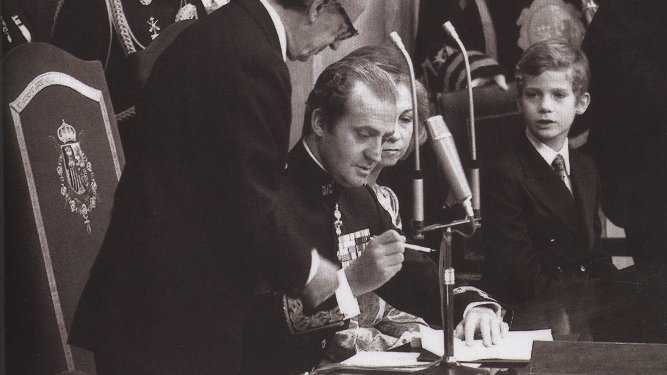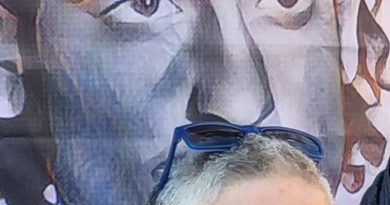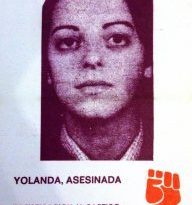A 40 years of the Constitution of '78: A critical look and the need for profound changes
It was the transition modélica? Can you give progressive answers the regime of '78? Does it serve the monarchy? Is there another way out?
Introduction
He 20 November 1975 Francisco Franco died. It was the official beginning of the "transition", the passage of a dictatorial regime to a democratic. In 1978 He saw the light of the current Constitution as the supreme norm for the law of the Spanish State. It was ratified in a referendum 6 from December, It entered into force on 29 the same month and was later sanctioned by King Juan Carlos I.
In such a way, What can you expect from a Constitution that was the result of the transition, he had to head to the political elite of Francoism, controlling the reform process? What can you expect from a Constitution born controlled by the same leaders of the previous dictatorial regime?
He established the parliamentary monarchy as a form of government, with a territorial organization based on municipalities, provinces and autonomous regions. The king is the head of state, moderates the functioning of institutions and assumes international representation. These are the pillars that, by the Judiciary, Legislative and repressive forces, It is the bourgeois institutional regime.
As we approach the anniversary of President Pedro Sanchez (PSOE) tops the presentation of various celebration events. discussions are held between former presidents of the PSOE and PP, Citizens develops its own agenda as VOX. Even they argue that it is necessary to change partial aspects, mostly reactionary, but it can not because there is no consensus. Beyond its electoral fights, joins a point: They are staunch defenders of the '78 regime and transition.
We do not share this position and we ask several questions lawful inducing exchange of views: It was the transition modélica? Can you give progressive answers the regime of '78? Does the Franco still entrenched in institutions? What social sectors favors? Is independent justice? What is the monarchy? How devoted bipartisanship? Is there a different output? Here are some of the questions we will answer from a critical perspective and conviction of the need for profound changes. This time, We examine some historical facts to the present, incorporating two notes on political killings and repression in transition: Yolanda Muñoz González and Gustau.
On the other hand, We complete this edition of DIGITAL SOL with notes on the balance of the Andalusian elections, mobilization 25-N, the G20 summit in Argentina, Russia-Ukraine clashes and the rebellion of the "yellow jackets" in France, among other topics.
The defeat of the dictatorship
February elections 1936 They gave the victory to the Popular Front, comprised Republican parties, including ERC, the PSOE and the Communist Party of Spain (PCE). The right, It took the result as a declaration of war. He 17 July 1936 It happened Franco's military uprising in Melilla, a day later spread to the rest of the peninsula and the archipelagos. The coup succeeded and failed in some areas of the country in (Asturias, Basque Country, Cantabria, Murcia, Catalonia, Madrid, were some). The uprising barely had popular support, It was based on the military. The uprising had different results according to the area of the country, which at one time it was divided.
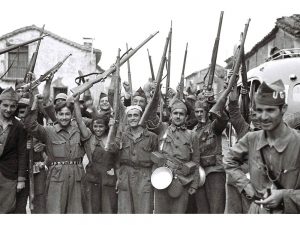
Behind this, ruptures caused in the structures of the Republic, and power was in the hands of organized labor committees in political parties and unions, without any centralized power.
Despite the large labor deployment and popular, coupled with the strength of the international brigades, Franco had great weight alliances and ended up defeating the Republicans after battles: Guernica, Ebro and Catalonia. In March Franco's troops they arrived in Madrid on 1 April and ended the war, which would be followed by a dictatorship, which would replace the trial of the democratic period of the Second Republic.
From 1939 Franco and Spain, They settle on a regime characterized by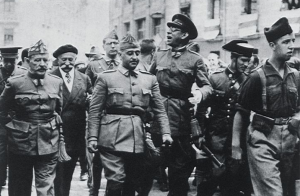 concentration of political power in Franco. anticommunism, antiparliamentarianism, antiliberalismo, nacionalcatolicismo, traditionalism, militarism, all fascist features, that had violence as a political means. Consolidation of the regime occurred with these rules, followed by a series of transformations and economic failures.
concentration of political power in Franco. anticommunism, antiparliamentarianism, antiliberalismo, nacionalcatolicismo, traditionalism, militarism, all fascist features, that had violence as a political means. Consolidation of the regime occurred with these rules, followed by a series of transformations and economic failures.
The consolidation of this revolutionary trial coincided with the beginning of a stage of defeat and retreat of fascist regimes and European Nazis, which shows the peculiarity of the situation in Spain.
Fresh traces of Franco
During 40 years, the military dictatorship imposed brutal levels of exploitation of the working class in the Spanish State. In the late '60 and early '70 the opposition intensified and the labor and student movement became stronger and even created a social network contestataria, He not managed to overthrow.
With the death of Franco in 1975 came through the window a breath of fresh air, workers felt it was time to make a break with the past and returned to the streets. There were reasons for optimism: in 1974 had occurred Carnation Revolution in Portugal which turned the dictatorship of the ruling salazarista from 1926.
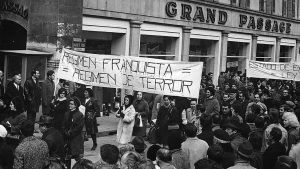 He began a strong rise of the class struggle, with waves of strikes over wage increases and democratic claims, such as freedom of association and freedom of political prisoners. Also it revived the struggle of nationalities. The regime tottered, but finally he managed to survive, partially readapt and last in time. He could do thanks to the collaboration of the PCE and PSOE actively operated to disrupt the mobilization and ensure the thirst for profit of capitalism.
He began a strong rise of the class struggle, with waves of strikes over wage increases and democratic claims, such as freedom of association and freedom of political prisoners. Also it revived the struggle of nationalities. The regime tottered, but finally he managed to survive, partially readapt and last in time. He could do thanks to the collaboration of the PCE and PSOE actively operated to disrupt the mobilization and ensure the thirst for profit of capitalism.
The PCE next to the trade union Comisiones Obreras (CC.OO.), which it had been founded during the dictatorship, the PSOE and the UGT, they agreed with King Juan Carlos Borbón and Franco's political future political regime forces. This endorsed the King as head of state, Army ensured continuity, the Civil Guard and the Police genocide with its hierarchical structure. There was no debugging and closed the road to a transparent investigation and trial and punishment of the repressors, torturers and murderers Franco.
The agreement devoted, Finally, with elections 1977. The question then is: They were constituent elections of '77? The call was not expressed that out is going to take a constitutional process, in fact, eliminated parts of the Political Reform Act that referred to the constitutional purpose. What, just they are saying "Democratic meaning, only it is acquired by majority will of a people; a village which becomes the decisive instance of the same reform ". They led the Spaniards to reform some laws of a regime that was already mostly buried.
In that referendum and elections 15 April '77, Suarez government was responsible for agreeing all, He legalized some parties and not others, as Republican Left Manuel Azana. The reason was his opposition to the state form. And Franco's right, Why did not any restrictions to go to elections? The PCE was legalized after giving up the claim of the Republic, and the PSOE had no trouble in reaching its legalization. Finally there were elections with participation 78,8% and one abstention 21,2%.
The people took the election as they presented them, as constituents, but they were summoned by a provisional government to gather an assembly that will determine the sovereignty of the people. So, after the process of drafting the measure to Parliament, after leaving out certain parties to be contrary to a form of state not yet established, the two main issues discussed were: the form of state (return or not to the Republic destroyed by the Franco) and the Amnesty Law.
With that law those responsible for crimes under Franco can not be judged until today, there is no Human Rights Commission in Congress and the Register of Associations is held at the headquarters of the Interior Ministry, as if people who decide to join were suspicious. How will this constitutional process, if the people could not decide how to punish crimes under Franco, nor decide how State? How it will be a constitutional process if the Minister Franco Rodolfo Martin Villa condemned and outlawed public freedoms and plurality of ideas, which they are the basis of democracy?
Thus it was formed the regime ' 78, based on pacts and institutionalization of silence (with the Amnesty Law), without being able to claim. This continued the brutal economic adjustment of the Moncloa Pacts that year and with the approval of the new constitution the following year.
The role of the working class and social movements
We often have to transition a success that introduced democracy in Spain as a result of the democratic commitment of all parties, especially the "left" with Carrillo and Felipe González to head. This version tailored for the interests of the ruling class, and left institutional. It is essential to know what the role of the working class during the Spanish transition, because they are lessons for the present, which let you see the strength and possibilities of a united labor movement.
It was from the '60s when the mobilization was more. Because from this year, class it was working industrializing, from the arrival of rural workers to the productive sectors. Along with this advance regeneration and mobilization, Another advance is noteworthy organization, the birth of CC.OO., which he helped the workers' organization in hiding.
it was working industrializing, from the arrival of rural workers to the productive sectors. Along with this advance regeneration and mobilization, Another advance is noteworthy organization, the birth of CC.OO., which he helped the workers' organization in hiding.
That way, was recovering slowly fighting spirit. It began with the miners' strike in Asturias, He is forcing the Minister Franco Solís Ruiz to negotiate with the miners. One of the weaknesses of the regime was that it lacked mechanisms of democratic negotiation, which facilitated the expansion and solidarity in the conquests of the working class, people and women. In this period called "silent strike" was followed by episodes like the conquest of the prohibition of free dismissal, or wage increases unthinkable, all with the working class at the head, always leading the struggle against the dictatorship, with courage and determination.
This time to strike posed a tremendous repression and was also punished with jail, so, supposed to endanger life. Even so, we see that the general strike was the instrument for claims, what the regime responded with repression.
Being willing to go through that risk was the result of the courage and strength that had the workers' struggle, which it was based on the enduring sense of organization and militancy in time, he planned and prepared the mobilizations to the smallest detail. And all this, through the central idea of fighting for socialism and the need for civil liberties.
Notably the strike conducted over 800 workers in Vizcaya, by lowering wages and the imposition by the company working patterns, although he missed was a milestone, the state had to use the state of emergency to stop it. You were always responses to capitalist attacks, in which the most advanced workers understood that to overthrow the Franco regime also had to get to its roots. Because, in 1976 there were elements of dual power after the general strike of Vitoria, assemblies based company, commissions elected to negotiate, use legal channels. The need to attack the root problem with the killing of five lawyers CC.OO. at the hands of a group of fascists, but it clashed with the interests of the PCE who wanted to compromise with the bourgeoisie and keep the masses under control.
The Moncloa Pacts
Achievement of these fights were great but the Moncloa Pacts 1977 , They made it out losing purchasing power, and that major leftist political parties, nationalism, government, CGT y CC.OO., "Sell the sacrifice of all workers a false democracy."
The struggle was continuous and forced to give the government, so, Why the big leftist parties and unions supported the Moncloa Pacts, if this meant a loss of purchasing power in all the rights already achieved? What time PCE leaders believed that the forms of workers' democracy must be neutralized and subordinated to political agreement with the elites of Francoism? At first the goal was the general strike, but these pacts made a shift from workers' assemblies, agreements that institutionalized negotiations between the domes.
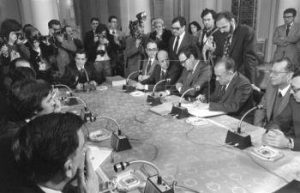 Why these pacts represented a loss of purchasing power, and therefore a throwback to all cattle? Statistics indicate that inflation rose to 24,6%, unemployment rose from 5% al 15-20% in the 80s, a stop beat the salary increase, Subcontracting is promoted, precarious and temporary employment. CC.OO. and UGT achieved a 10% representation at national level and 15% at regional level. All this, in exchange for entering state institutions.
Why these pacts represented a loss of purchasing power, and therefore a throwback to all cattle? Statistics indicate that inflation rose to 24,6%, unemployment rose from 5% al 15-20% in the 80s, a stop beat the salary increase, Subcontracting is promoted, precarious and temporary employment. CC.OO. and UGT achieved a 10% representation at national level and 15% at regional level. All this, in exchange for entering state institutions.
Definitely, the main nationalist parties ended up coming into this big deal, waiving the right to self-determination and accepting limited autonomy in return. ERC was the case and the parties grouped in Convergence and Union after the adoption of the Statute of Autonomy of Catalonia in 1979. This regime 78, Alternating PSOE and PP (Popular party, the latest heir to the old Francoist right, Today in dispute with Citizens and Vox), with the support of traditional nationalist parties, It has guaranteed for decades to the Spanish and European bourgeoisie "stability" required to squeeze their profits from workers.
The role of women
During the transition 21 MPs and 6 senators (a total of 700 between the two chambers of parliament) They were part of a tough political change and defended the rights of women. From May 1975 women began to have more independence and feminist struggle began to make themselves look.
These women were part of basic conquests as the disappearance of the figure of the husband as head of household at least in theory and in the Civil Code, we might note in this regard to Mary Telo. As a lawyer solo, He exerted enough pressure in relation to women's rights and fought for the modification and the conquest of certain rights, for example, to open a bank account, accept an inheritance, appear in trials and hire themselves without husband's permission.
Women's wrestling left also felt in the conquest of laws such as the legalization of contraception and pension teachers Republicans pursued by Franco. They were a group of 27 women from public life contributed to political change, and thanks to which the art was established. 14 which states that "Spaniards are equal before the law without discrimination can prevail ..." Of course today the struggle goes far beyond, but at that time it was an important achievement.
We leave an important message is that "in politics, not everything, but there are some values to get and transmit ", and another thing to note is that many of these women shared the phrase "we will not give thanks for nothing".
It is interesting to rescue a phrase of Robespierre: "A people whose leaders must not account for their management does not have anyone Constitution. A people whose leaders are only accountable to other inviolate leaders, It has no constitution, as it depends on them with impunity betray him and let him betray the others ... ".
The Spanish government is accountable only to big business, It is therefore necessary constituent and assembly process, to provide us with a new political framework in the service of the majorities in feminist politics that are fully cross.
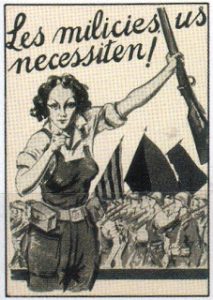 In this sense women, we must also be part of a political change, to respond to the capitalist and patriarchal attack we suffer, and leave behind both established in the transition as the entire political class regime that supported this Constitution delegitimized. This involves deciding a new form of state and regime, without the monarchy that sustains patriarchy, heteronormativity and the capitalist model.
In this sense women, we must also be part of a political change, to respond to the capitalist and patriarchal attack we suffer, and leave behind both established in the transition as the entire political class regime that supported this Constitution delegitimized. This involves deciding a new form of state and regime, without the monarchy that sustains patriarchy, heteronormativity and the capitalist model.
Unlike other dictatorial regimes, the Franco regime was not defeated by the popular mobilization, despite the strength that had the working class, its efforts for unity and organization, something the history books left in the background. Thus, bourgeois power and its representatives enjoyed leeway to assert their interests. Political and union leaderships played a prime role to avoid a final and categorical break with the past. Definitely, They put their "bit" for the anti-democratic provisions of the Franco regime moved in new clothes, only camouflaged, institutions of capitalist formal democracy. The fresh air that came through the window by the death of dictator rarefied and vitiate the transition that had nothing modélica. In the process, They continued to operate the same protagonists of fear so many years, to ensure continuity of the central aspects of Francoism.
In that period there were more than 200 political assassinations, the most clearly recognizable, others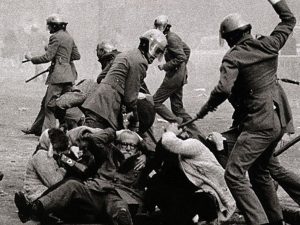 thinly disguised to divert attention. For this reason, We take two of those cases in which victims were comrades Yolanda González Y Gustau Muñoz.
thinly disguised to divert attention. For this reason, We take two of those cases in which victims were comrades Yolanda González Y Gustau Muñoz.
We spread in the past because without it, it is impossible to understand the problems of this, shapes changed, but with the same content background. It is impossible not to feel pain and sadness for the civil war and dictatorship. But, "Turn page" not solve the problems, the deepens; allows further accumulation of contradictions and injustices that at some point break out in various ways.
There is another way
Monarchical-Franco regime for years is in crisis and shows its exhaustion, its insurmountable limitations to provide democratic and social responses to large majorities. Since the fall of the dictatorship regularly voted, but under established mechanisms to favor governing bipartism PP-PSOE, the tandem consolidated corruption. Democracy is imprisoned within the regime and nor PSOE '78, PP, Vox citizens and want to release it with profound changes in the Constitution, and when proposing, They are partial or directly reactionary.
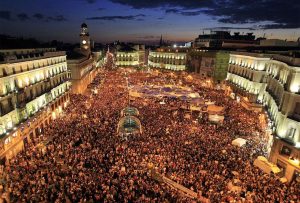 Grow below samples upset by the social situation, political and democratic freedoms cut. The demonstrations of 15-M and the Indignados were a clear example of the glut of broad sectors of society, also the feminist movement, pensioners, the Catalans and other.
Grow below samples upset by the social situation, political and democratic freedoms cut. The demonstrations of 15-M and the Indignados were a clear example of the glut of broad sectors of society, also the feminist movement, pensioners, the Catalans and other.
To exit the social tangle, political and social nationalities and democratic fundamental changes are needed, Uncompromising. Elections must devote a proportional representation direct presidential election. A government under social control, unprivileged, with officials who receive salaries equivalent to that of a skilled worker and obligation to use public health services, education, transport, etc. as the population ago. With severe punishments to corrupt.
When there is popular discontent with officials the answer is "Wait for the end of the mandate and vote differently." It is inadmissible, it is necessary that the charges are revocable and participatory mechanisms of direct democracy such as the referendum acquired, binding referenda and others that allow working people to decide their own destiny.
Franco was buried in the Valley of the Fallen, in the same space their victims. Many of fascist symbols and the honors that had been granted car remains as it were erected. We agree to remove the remains of the dictator of the current monument to fascism found, but not to "turn page", State unpunished crimes and crimes against humanity do not prescribe, They should be clarified, tried and punished. To open and secret files are rebuilt, theft of goods and people are cleared to compensate the victims or their relatives. To withdraw from the public space all fascist symbols.
Monarchical restoration is not symbolic, as some to divert attention from the  existence of such an anachronism. The king, is Juan Carlos I or Felipe VI, It plays an active role in both external and internal affairs: arms sales to Saudi Arabia murderer regime, aval repression 1-O, etc. The royal family enjoys wealth and privilege tinged scandals of all kinds, while the population suffers basic needs. In Republican Spain the monarchy was an institution buried in the dustbin of history, Franco revived and recycled to the transition think we should persevere in time. Abolish the monarchy, Philip VI and the royal family go to work, they are stripped of their privileges, luxury goods can be held accountable and brought to justice as anyone.
existence of such an anachronism. The king, is Juan Carlos I or Felipe VI, It plays an active role in both external and internal affairs: arms sales to Saudi Arabia murderer regime, aval repression 1-O, etc. The royal family enjoys wealth and privilege tinged scandals of all kinds, while the population suffers basic needs. In Republican Spain the monarchy was an institution buried in the dustbin of history, Franco revived and recycled to the transition think we should persevere in time. Abolish the monarchy, Philip VI and the royal family go to work, they are stripped of their privileges, luxury goods can be held accountable and brought to justice as anyone.
In the passage to democracy, Franco kept addicts dependent judges and justice consolidated political power shift, partial and vindictive serving the economic interests. Judges are elected by the power and respond to it. Judge Pablo Llarena is a brutal expression of it. Following the guidelines of M.Rajoy and PP, He did not hesitate to invent false reasons for
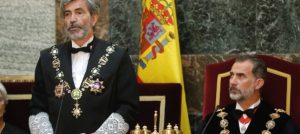
rebellion and sedition against leaders, activists, neighbors and personalities of art and culture, by the mere fact of thinking differently and democratically defend their ideals for self-determination of Catalonia. Faithful to the covenants above, Pedro Sánchez made a pact with the PP place in the General Council of the Judiciary to reactionary Manuel Marchena, As then it failed because of the rejection that caused.
before a (in) justice propose: release political prisoners and exiles, the annulment of the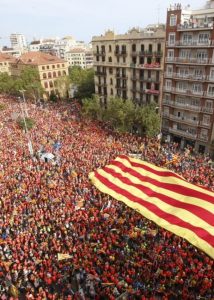 causes invented. Full freedom of ideas and expression, Down the Law Mordaza. To ensure popular sovereignty in justice, must stipulate that the election and removal of judges, as well as oversight of judicial proceedings are subject to social control, implement the direct election of judges by popular vote, ensure mechanisms of social control and regulate recall of judges and finally, review and actually implement jury trials, and also there is a gender-sensitive training for judges, judges and prosecutors. These are measures to implement a real court democratization.
causes invented. Full freedom of ideas and expression, Down the Law Mordaza. To ensure popular sovereignty in justice, must stipulate that the election and removal of judges, as well as oversight of judicial proceedings are subject to social control, implement the direct election of judges by popular vote, ensure mechanisms of social control and regulate recall of judges and finally, review and actually implement jury trials, and also there is a gender-sensitive training for judges, judges and prosecutors. These are measures to implement a real court democratization.
The Catholic Church, faithful defender of the dictatorship, It retains its political and economic power as if nothing had happened. Influencing state decisions that violate democratic rights of women, Young, sexual and racial minorities. They continue receiving state money that could be used for social purposes, they have wealth, privileges and are punctuated by serious scandals. 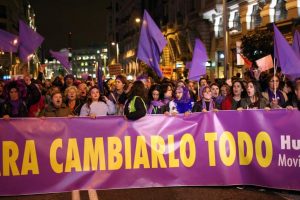 Against this offer: freedom of worship, State one euro destined to the Catholic Church, which he wants a cure that would pay out of pocket, no religious education in public schools, ignorance of the interference of Catholicism in the sexual lives of people and the right to decide over her own body, legal abortion, free and guaranteed, complete separation of Church and State.
Against this offer: freedom of worship, State one euro destined to the Catholic Church, which he wants a cure that would pay out of pocket, no religious education in public schools, ignorance of the interference of Catholicism in the sexual lives of people and the right to decide over her own body, legal abortion, free and guaranteed, complete separation of Church and State.
Franco also put into practice a "cultural genocide" with the abolition of different languages in schools and everyday, both private and public, with the aim of imposing the use of Castilian and homogenize society under fascist precepts. Different peoples of the peninsula saw alibi freedom of expression and national and cultural identity. In particular Catalonia, there is a permanent investment offensive language, culture and recognition of the Catalan nation as a historical and genuine expression to respect as such. We are for the recognition of the right to self-determination and to choose freely with which other people wish to live and under what rules, if they want to be part of the Spanish State and the European Union, which it is an imperialist bloc at the service of the powerful and not of peoples. It is the only way for a nonrestrictive relationship or social tension.
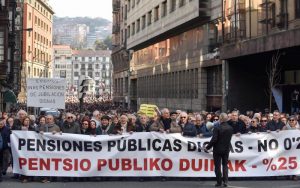
The bourgeoisie and the big bourgeoisie are still the favored large, As was the case with the de facto power. A 10 years of crisis 2008 You can make a clear balance: It is not yet closed, You can come back anytime and defaced the social landscape. bankers, entrepreneurs and the rich were saved from bankruptcy and again, their gains were more than offset by guaranteed PP-PSOE, we indebted for years with international usurers and subjected us to the designs Brussels. You have to give a cut to this situation: nationalization of banks, foreign trade and the mainspring of the economy, not usurious debt payments, nor impositions from Brussels to the designs of IBEX35.
The other side will be given a population that is impoverished amid growing social inequality, prices increase, wages are not enough, access to homeownership and rental almost impossible abusive. Money for Health, education, living place, gender and social assistance to the poorest, to the socially disadvantaged and the needy immigrants.
There is a loss of historical gains of the working class unprecedented, immersed in the 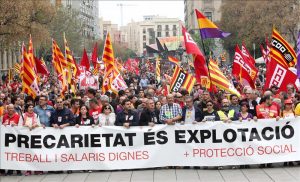 job insecurity, actors whose most affected are women, young people and immigrants, lxs with miserable coins for pensioners who worked a lifetime and unemployment figures rather than bulging. This is done with the complicity by action or omission of the leaders of the trade unions CGT-CC.OO., accommodated with the power and employers, you are increasingly distances of the working class and its traditional tools of struggle and mobilization and the general strike.
job insecurity, actors whose most affected are women, young people and immigrants, lxs with miserable coins for pensioners who worked a lifetime and unemployment figures rather than bulging. This is done with the complicity by action or omission of the leaders of the trade unions CGT-CC.OO., accommodated with the power and employers, you are increasingly distances of the working class and its traditional tools of struggle and mobilization and the general strike.
we propose: cancellation of labor reform laws, increases in wages and pensions to cover all needs, full recognition of labor rights and gender of women, Equal pay and equal opportunities to access management positions, National income housing plan with membership fees, to meet the need of own roof, revive the economy and eliminate unemployment. That the crisis pay the capitalists and usurers that caused it and not the working people.
Greater or lesser extent, with more or less depth, workers and the people feel, suffer, or polemicize exchange views on these issues from different perspectives. What can not be denied is that there are social needs, policies, democratic and cultural unsatisfied in these 40 years passed. They talk about them in the streets, in places of work or study, with the neighbour, friends or relatives, When they not expressed in mass mobilization as the case of women's movement, pensioners and the Catalan people.
There are parties how we can come and go in their questioning of the regime, even they have been uttered by dissolving the monarchy. Nevertheless, They do not go to the bottom of the issue and end up bogged down in the framework of the bourgeois regime and the capitalist system. It is more necessary than ever to promote and facilitate the ability of people to discuss and decide on all these issues, that road goes through the unitary mobilization to impose a Constituent Assembly Free and Sovereign, with broad popular participation. Have in their hands the ability to review and define their own destinies, on the disasters of capitalist exploitation and definitions capture the majority in a new constitution. On this way, We continue to strive for an exit strategy: by a government of workers and the people, for socialism with workers' democracy and a free Ibéricas Federation of Socialist Republics.
A 40 Birth year Constitución', '78 the regime and transition, there is nothing to celebrate and much for which to fight because there are many debts with workers, the villages, Young, women, pensioners and all LA Anarchist oprimidxs and explotaxs. All and all Spanish, we should question many things about the transition, and every 6 from 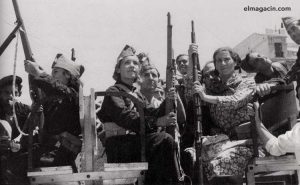 December, out in memory of each and every dead comrades and killed in the hands of Franco, and instead of cleaning up the history of many figures of Francoism, instead of talking about a democratic process, talk about each and every fellow who sacrificed and fought against dictatorship and suffered and fought for implanting freedoms. a deep and honest debate about the past is needed, It is necessary to break with the political consensus of the bourgeoisie.
December, out in memory of each and every dead comrades and killed in the hands of Franco, and instead of cleaning up the history of many figures of Francoism, instead of talking about a democratic process, talk about each and every fellow who sacrificed and fought against dictatorship and suffered and fought for implanting freedoms. a deep and honest debate about the past is needed, It is necessary to break with the political consensus of the bourgeoisie.
Laura Jaen - Manel Lecha

